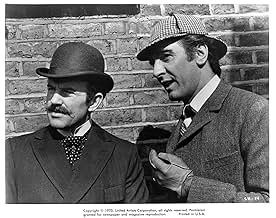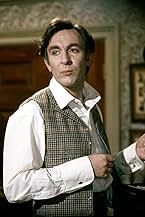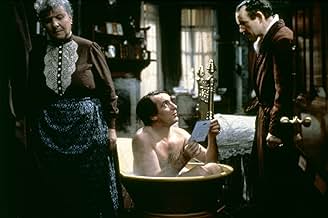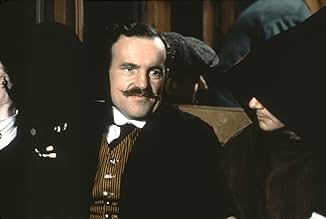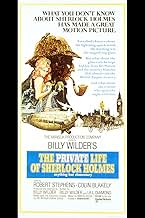La vie privée de Sherlock Holmes
Titre original : The Private Life of Sherlock Holmes
- 1970
- Tous publics
- 2h 5min
NOTE IMDb
7,0/10
14 k
MA NOTE
Quand un Holmes qui s'ennuie se saisit du cas de Gabrielle Valladon après une tentative d'homicide, la recherche du mari disparu le mène au Loch Ness et au monstre légendaire.Quand un Holmes qui s'ennuie se saisit du cas de Gabrielle Valladon après une tentative d'homicide, la recherche du mari disparu le mène au Loch Ness et au monstre légendaire.Quand un Holmes qui s'ennuie se saisit du cas de Gabrielle Valladon après une tentative d'homicide, la recherche du mari disparu le mène au Loch Ness et au monstre légendaire.
- Réalisation
- Scénario
- Casting principal
- Récompenses
- 3 nominations au total
Geneviève Page
- Gabrielle Valladon
- (as Genevieve Page)
Avis à la une
I only found out recently that the film was heavily cut. Two whole missing sections - The Curious Case of the Upside Down Room and The Case of The Naked Honeymooners never made it to the theatrical release, as well as a couple of other small sections. Where the hell are they? In these days of extended editions, DVD extras, etc, this would be a perfect chance to show Billy's film as he had intended. Touch of Evil was re-cut to Welles original specification recently, so it is possible - providing you still have access to the material. Even if it is too long - a reported 3 hours and twenty minutes - I'd like the chance to make my own mind up.
The film itself is still of interest. Performances are good, it is atmospheric, both visually and musically and the humour not too out of place. The homosexual/misogyny angle is of particular interest and one of the main reasons why Billy set out to try and make a Sherlock Holmes picture in the first place. Many of Billy's films carry these themes, of course, but Holmes mysterious quality leant itself to this interpretation. And so what? He may be in the closet, but he still falls for Gabrielle Valadon. And the end...very touching, beautifully handled.
The film itself is still of interest. Performances are good, it is atmospheric, both visually and musically and the humour not too out of place. The homosexual/misogyny angle is of particular interest and one of the main reasons why Billy set out to try and make a Sherlock Holmes picture in the first place. Many of Billy's films carry these themes, of course, but Holmes mysterious quality leant itself to this interpretation. And so what? He may be in the closet, but he still falls for Gabrielle Valadon. And the end...very touching, beautifully handled.
Sherlock Holmes (Robert Stephens) and Dr. Watson (Colin Blakely) get involved in a very weird case involving a mysterious French woman (Geneuieve Page), Sherlock's brother Mycroft (Christopher Lee), midgets, Scotland, the Queen and the Loch Ness Monster! Believe it or not they all come together. I originally saw this on TV back in the late 70s but it was so heavily edited (for instance, the entire first half hour was gone because it dealt with gay characters which was still a taboo on TV back then) that I couldn't follow it and gave up. Now it's back on uncut and I'm glad I'm finally able to see it.
A very strange movie but lots of fun. Some people think this is a spoof. It really isn't but there are some very funny moments--my favorite is at the beginning when Holmes blasts Watson for how he writes about his cases--"Watson, I've never said 'elementary my dear Watson' in my life!""Poetic license Holmes". There's also quite a few funny one liners mostly delivered with great relish by Stephens and it does deal with the sexual relations of Holmes and Watson (it was hinted that they were gay lovers). But it does involve a very serious case and the jokes stop towards the end.
Stephens is actually very good as Holmes--he won't make you forget Basil Rathbone but he's not bad. Colin Blakely isn't as big a buffoon as Nigel Bruce was but he tends to overact a little. Page is just terrible as the mystery woman--but then again, English is her second language. Lee, surprisingly, is kind of stiff as Mycroft. He's a very good actor--I'm surprised to see him so bad.
The movie is very lavish (probably because Billy Wilder was involved)...a lot of money and attention was given to sets and costumes, and they actually went on location to shoot the end in Scotland. The cinematography is just beautiful and the movie was never dull. It doesn't always mix the comedy with the drama successfully but it works more often than it misses. As most people know this was HEAVILY edited before it was released and the uncut version doesn't seem to exist anymore. That's too bad but what remains is not bad. Worth catching...a must see for Holmes fans.
A very strange movie but lots of fun. Some people think this is a spoof. It really isn't but there are some very funny moments--my favorite is at the beginning when Holmes blasts Watson for how he writes about his cases--"Watson, I've never said 'elementary my dear Watson' in my life!""Poetic license Holmes". There's also quite a few funny one liners mostly delivered with great relish by Stephens and it does deal with the sexual relations of Holmes and Watson (it was hinted that they were gay lovers). But it does involve a very serious case and the jokes stop towards the end.
Stephens is actually very good as Holmes--he won't make you forget Basil Rathbone but he's not bad. Colin Blakely isn't as big a buffoon as Nigel Bruce was but he tends to overact a little. Page is just terrible as the mystery woman--but then again, English is her second language. Lee, surprisingly, is kind of stiff as Mycroft. He's a very good actor--I'm surprised to see him so bad.
The movie is very lavish (probably because Billy Wilder was involved)...a lot of money and attention was given to sets and costumes, and they actually went on location to shoot the end in Scotland. The cinematography is just beautiful and the movie was never dull. It doesn't always mix the comedy with the drama successfully but it works more often than it misses. As most people know this was HEAVILY edited before it was released and the uncut version doesn't seem to exist anymore. That's too bad but what remains is not bad. Worth catching...a must see for Holmes fans.
When a bored Holmes (Robert Stephens who also played Holmes on the stage and in TV series 'The Rivals of Sherlock Holmes') eagerly takes the case of Gabrielle Valladon (Genevieve Page) after an attempt on her life , the search for her missing husband leads to Sherlock and Watson (Colin Blakely) towards Loch Ness and the legendary monster. This affectionate story reveals the secret allegedly hidden by Holmes and Watson .
Atypical Holmes movie , resulting to be a extremely personal pastiche of the Arthur Conan Doyle stories and takes a melancholic point of sight at famous eye private . It is packed with intrigue , thrills , emotion , taste , wit , and of course ,intrigue . In the flick appears the usual of the Arthur Conan Doyle's novels : Mycroft (Sherlock's brother , well played by Christopher Lee) , Mistress Hudson (Irene Handl) , and as always Doctor Watson (Colin Blakely). Furthermore , a notorious secondary cast as Clive Revill , Stanley Holloway as an undertaker , Catherine Lacey in her last cinema film and the classic dancer Tamara Toumanova . The film has an enjoyable atmosphere , it's in wonderful color that originates a glamorous setting created by the magnificent cameraman Chistopher Challis , and filmed at Pinewood Studios , Buckinghamshire, and Inverness , Highland , Scotland . Production design by the expert Alexandre Trauner is of first rate , the movie is very atmospheric , 221 Baker Street home , the streets of London , castles are very well designed .
Robert Stephens's interpretation is magnificent, he's one of the best Sherlock Holmes in the cinema , likeness to Peter Cushing and Jeremy Brett in television. Robert Stephens as Holmes plays in a clever , broody and impetuous manner . Colin Blakely plays as Watson with humor, goofy and joy , he's the perfect counterpoint to Holmes . However , initially Peter O'Toole was going to play Sherlock Holmes with Peter Sellers playing Dr. Watson, but Billy Wilder decided to go with lesser known stars instead . Originally, the scenes featuring the Loch Ness Monster were intended to be filmed in the actual Loch , a life-size prop was built which had several Nessie-like humps used to disguise flotation devices , the humps were removed, however, at Billy Wilder's request. Unfortunately, during a test run in Loch Ness, the Monster-prop sank and was never recovered ; a second prop was built, but was only filmed inside a studio tank . At the request of director Billy Wilder, composer Miklós Rózsa adapted music from his own Violin Concerto , opus 24 , as the basis for the film score, supplementing this with further original music.
This special Billy Wilder movie takes melancholy look at Holmes . Apparently, he had been a fan of Sherlock Holmes for many years prior to making this picture. Wilder said of this flick in the book 'Conversations with Wilder' by 'Cameron Crowe' : " when I came back from Paris, it was an absolute disaster, the way it was cut. The whole prologue was cut, a half-sequence was cut , in fact it was intended as a 3 and half hour film . I had tears in my eyes as I looked at the thing. It was the most elegant picture I've ever shot ¨ . The motion picture was panned by the critics whose reputation should soar in future years , being recently a 12 minutes restored . Rating : Better than average , 7/10 . Well worth watching .
Atypical Holmes movie , resulting to be a extremely personal pastiche of the Arthur Conan Doyle stories and takes a melancholic point of sight at famous eye private . It is packed with intrigue , thrills , emotion , taste , wit , and of course ,intrigue . In the flick appears the usual of the Arthur Conan Doyle's novels : Mycroft (Sherlock's brother , well played by Christopher Lee) , Mistress Hudson (Irene Handl) , and as always Doctor Watson (Colin Blakely). Furthermore , a notorious secondary cast as Clive Revill , Stanley Holloway as an undertaker , Catherine Lacey in her last cinema film and the classic dancer Tamara Toumanova . The film has an enjoyable atmosphere , it's in wonderful color that originates a glamorous setting created by the magnificent cameraman Chistopher Challis , and filmed at Pinewood Studios , Buckinghamshire, and Inverness , Highland , Scotland . Production design by the expert Alexandre Trauner is of first rate , the movie is very atmospheric , 221 Baker Street home , the streets of London , castles are very well designed .
Robert Stephens's interpretation is magnificent, he's one of the best Sherlock Holmes in the cinema , likeness to Peter Cushing and Jeremy Brett in television. Robert Stephens as Holmes plays in a clever , broody and impetuous manner . Colin Blakely plays as Watson with humor, goofy and joy , he's the perfect counterpoint to Holmes . However , initially Peter O'Toole was going to play Sherlock Holmes with Peter Sellers playing Dr. Watson, but Billy Wilder decided to go with lesser known stars instead . Originally, the scenes featuring the Loch Ness Monster were intended to be filmed in the actual Loch , a life-size prop was built which had several Nessie-like humps used to disguise flotation devices , the humps were removed, however, at Billy Wilder's request. Unfortunately, during a test run in Loch Ness, the Monster-prop sank and was never recovered ; a second prop was built, but was only filmed inside a studio tank . At the request of director Billy Wilder, composer Miklós Rózsa adapted music from his own Violin Concerto , opus 24 , as the basis for the film score, supplementing this with further original music.
This special Billy Wilder movie takes melancholy look at Holmes . Apparently, he had been a fan of Sherlock Holmes for many years prior to making this picture. Wilder said of this flick in the book 'Conversations with Wilder' by 'Cameron Crowe' : " when I came back from Paris, it was an absolute disaster, the way it was cut. The whole prologue was cut, a half-sequence was cut , in fact it was intended as a 3 and half hour film . I had tears in my eyes as I looked at the thing. It was the most elegant picture I've ever shot ¨ . The motion picture was panned by the critics whose reputation should soar in future years , being recently a 12 minutes restored . Rating : Better than average , 7/10 . Well worth watching .
What American film makers have done to Sherlock Holmes from the 1970's onwards amounts to celluloid crime. They have inflicted upon us the risible 'Seven per cent solution' and the infantile 'Sherlock Holmes' Smarter Brother' to name but two. We have also had to endure portrayals of the Baker Street sleuth by George C. Scott, Charlton Heston, Robert Downey Jnr. Will Ferrel, Roger Moore, Michael Caine and more recently Ian McKellen as a Holmes with dementia. If that weren't enough we have had the animated 'Sherlock Gnomes' and now heaven help us, Sherlock Holmes' sister!
All of the above are too hideous to contemplate and it is with great relief that I come to Billy Wilder's 'satirical homage' to Conan Doyle's great creation.
Editor Ernest Walter was assigned the unenviable task of reducing the running time by more than half. The question is, did the loss of two stories make it less of a film? Judging by the extracts of 'missing scenes' on You Tube, I think 'not' but will no doubt be shot down in flames for saying so. The inclusion of those scenes would certainly have made it far more of a parody than is the surviving footage but what remains is parody enough in my opinion.
It is the strange mixture of irreverence and homage, satire and sadness that tends to hamper my enjoyment of it.
It begins very well and the scenes involving Imperial Ballet director Rogozhin, superbly played by Clive Revill, the Prima Ballerina Madame Petrova of Tamara Toumanova and the Holmes of Robert Stephens are masterful. We are then introduced to the enigmatic and fascinating Gabrielle Valladon played by the equally enigmatic and fascinating Genevieve Page. After that the film somehow loses focus and momentum and the later scenes in Inverness are distinctly lame and rather childish.
It is only since his death that we have learned how troubled a soul was actor Robert Stephens who reportedly attempted suicide during the making of this. His demeanor suits admirably the director's concept of Holmes as not just an analytical thinking machine but as a mere mortal with the same flaws and hang ups as the rest of us. Wilder's concept of Dr. Watson as an overgrown schoolboy is not really to my taste but Colin Blakely does well enough.
Certainly not to my taste is Christopher Lee as Mycroft. He has the unique distinction of having played Mycroft and Sherlock on film and both portrayals highlight his limitations as an actor. Apparently he was a last minute replacement for the inimitable George Sanders. What a pity.
Actress Mollie Maureen, through no fault of her own, is a grotesque caricature of Queen Victoria whilst the Scottish accent of Stanley Holloway as the gravedigger needs to be heard to be abhorred.
The melancholic, bitter sweet nature of the film is underlined by the music of maestro Miklos Rozsa. He has the taken the more lyrical elements of the Violin Concerto he wrote for Jascha Heifetz in 1956 and incorporated them into one of his greatest scores. Alexandre Trauner's production design is, as always, exemplary.
As one would expect from this director, the verbal takes precedence over the visual and textually reveals Wilder's undeniable respect for and knowledge of Conan Doyle's world.
This material was close to Wilder's heart and he could not fail to be wounded by the critical mauling it received and the total disinterest of cinema goers.
One is inclined to treat it kindly because it comes from Billy Wilder but despite its merits it must alas be considered a 'near miss' as indeed were his subsequent films.
Old directors never die, it is said. They just lose their sense of direction!
All of the above are too hideous to contemplate and it is with great relief that I come to Billy Wilder's 'satirical homage' to Conan Doyle's great creation.
Editor Ernest Walter was assigned the unenviable task of reducing the running time by more than half. The question is, did the loss of two stories make it less of a film? Judging by the extracts of 'missing scenes' on You Tube, I think 'not' but will no doubt be shot down in flames for saying so. The inclusion of those scenes would certainly have made it far more of a parody than is the surviving footage but what remains is parody enough in my opinion.
It is the strange mixture of irreverence and homage, satire and sadness that tends to hamper my enjoyment of it.
It begins very well and the scenes involving Imperial Ballet director Rogozhin, superbly played by Clive Revill, the Prima Ballerina Madame Petrova of Tamara Toumanova and the Holmes of Robert Stephens are masterful. We are then introduced to the enigmatic and fascinating Gabrielle Valladon played by the equally enigmatic and fascinating Genevieve Page. After that the film somehow loses focus and momentum and the later scenes in Inverness are distinctly lame and rather childish.
It is only since his death that we have learned how troubled a soul was actor Robert Stephens who reportedly attempted suicide during the making of this. His demeanor suits admirably the director's concept of Holmes as not just an analytical thinking machine but as a mere mortal with the same flaws and hang ups as the rest of us. Wilder's concept of Dr. Watson as an overgrown schoolboy is not really to my taste but Colin Blakely does well enough.
Certainly not to my taste is Christopher Lee as Mycroft. He has the unique distinction of having played Mycroft and Sherlock on film and both portrayals highlight his limitations as an actor. Apparently he was a last minute replacement for the inimitable George Sanders. What a pity.
Actress Mollie Maureen, through no fault of her own, is a grotesque caricature of Queen Victoria whilst the Scottish accent of Stanley Holloway as the gravedigger needs to be heard to be abhorred.
The melancholic, bitter sweet nature of the film is underlined by the music of maestro Miklos Rozsa. He has the taken the more lyrical elements of the Violin Concerto he wrote for Jascha Heifetz in 1956 and incorporated them into one of his greatest scores. Alexandre Trauner's production design is, as always, exemplary.
As one would expect from this director, the verbal takes precedence over the visual and textually reveals Wilder's undeniable respect for and knowledge of Conan Doyle's world.
This material was close to Wilder's heart and he could not fail to be wounded by the critical mauling it received and the total disinterest of cinema goers.
One is inclined to treat it kindly because it comes from Billy Wilder but despite its merits it must alas be considered a 'near miss' as indeed were his subsequent films.
Old directors never die, it is said. They just lose their sense of direction!
Billy Wilder's excellent 1970 film handles the whole subject of Sherlock Holmes from a refreshingly different angle. As the title suggests, the film is rather more concerned with characterisation than plot, which although entertaining and original, is hardly an adequate stage to show off Holmes' exceptional talents.
Instead, Wilder and Diamond start with the premise that "Watson's" stories for Strand Magazine were a little more lurid than the "reality" and use it to develop a more subtle characterisation than the "thinking machine" of the literary Holmes. Admittedly, the film probably concentrates on Holmes' celebrated cocaine habit more than it should, but all references are lifted straight from the book and in any case, Stephens does not dwell on it.
Stephens himself is quite simply excellent, giving Holmes' a depth of character not seen again until Jeremy Brett on the small screen. Stephens' performance leaves us with a slightly melancholy Holmes', a man who perhaps regrets that, unlike Watson, he has dedicated his life to pure reason and while the screenplay hints at Holmes' sexuality, Stephens deflects it masterfully, remaining ambivalent and gentile where a less accomplished actor would have been simply camp, and so uses the suggestion to wrap another layer of ambiguity about the character.
All in all, Wilder and Stephens combine to make a refreshingly accessible Holmes and the entertainment comes from the interplay of characters rather than pace of plot.
Instead, Wilder and Diamond start with the premise that "Watson's" stories for Strand Magazine were a little more lurid than the "reality" and use it to develop a more subtle characterisation than the "thinking machine" of the literary Holmes. Admittedly, the film probably concentrates on Holmes' celebrated cocaine habit more than it should, but all references are lifted straight from the book and in any case, Stephens does not dwell on it.
Stephens himself is quite simply excellent, giving Holmes' a depth of character not seen again until Jeremy Brett on the small screen. Stephens' performance leaves us with a slightly melancholy Holmes', a man who perhaps regrets that, unlike Watson, he has dedicated his life to pure reason and while the screenplay hints at Holmes' sexuality, Stephens deflects it masterfully, remaining ambivalent and gentile where a less accomplished actor would have been simply camp, and so uses the suggestion to wrap another layer of ambiguity about the character.
All in all, Wilder and Stephens combine to make a refreshingly accessible Holmes and the entertainment comes from the interplay of characters rather than pace of plot.
Le saviez-vous
- AnecdotesBy the time of filming, Sir Christopher Lee had become famous as Count Dracula. When he and Billy Wilder walked on the shores of Loch Ness at dusk, with bats circling overhead, Wilder said to him, "You must feel quite at home here."
- GaffesThe events start in August 1887 and apparently take place in the following weeks or, at most, months. However, Mycroft Holmes tells Queen Victoria that Kaiser Wilhelm II had Count Zeppelin working on dirigibles that could drop bombs on Buckingham Palace. Wilhelm II did not become Kaiser until 15 June 1888, and Zeppelin did not start constructing rigid airships until the 1890s.
- Versions alternativesOriginally released at 125 minutes; the US laserdisc version adds 12 minutes of unreleased footage, including a sequence known as "The Dreadful Business of the Naked Honeymooners", featuring Jonathan Cecil and Nicole Shelby
- ConnexionsFeatured in The Many Faces of Sherlock Holmes (1985)
- Bandes originalesConcerto for Violin and Orchestra Opus 24
by Miklós Rózsa
Meilleurs choix
Connectez-vous pour évaluer et suivre la liste de favoris afin de recevoir des recommandations personnalisées
Détails
- Date de sortie
- Pays d’origine
- Langues
- Aussi connu sous le nom de
- The Private Life of Sherlock Holmes
- Lieux de tournage
- Sociétés de production
- Voir plus de crédits d'entreprise sur IMDbPro
Box-office
- Budget
- 10 000 000 $US (estimé)
- Montant brut mondial
- 19 930 $US
Contribuer à cette page
Suggérer une modification ou ajouter du contenu manquant

Lacune principale
By what name was La vie privée de Sherlock Holmes (1970) officially released in India in English?
Répondre

